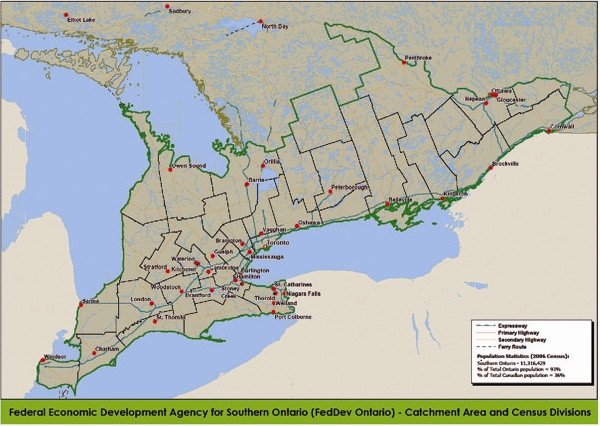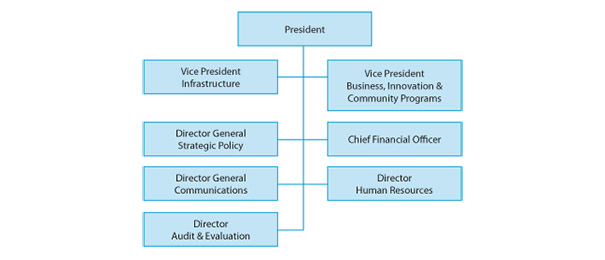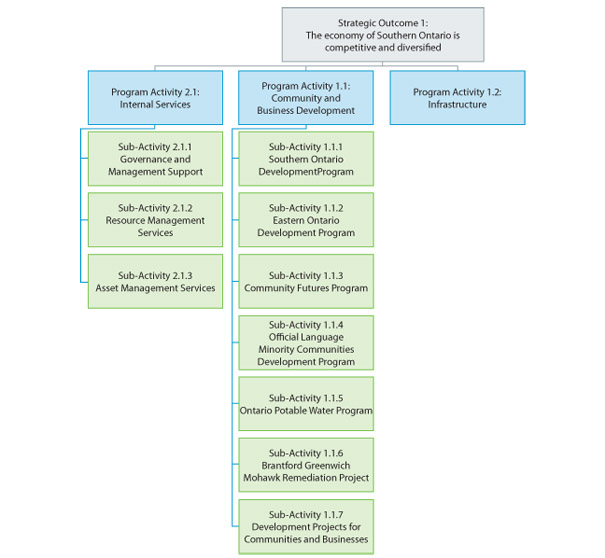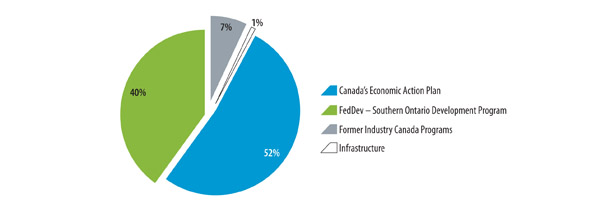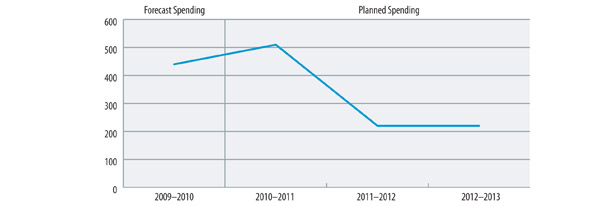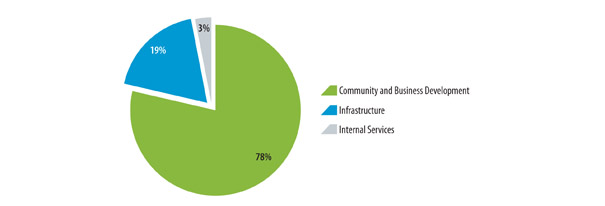ARCHIVED - Federal Economic Development Agency for Southern Ontario
 This page has been archived.
This page has been archived.
Archived Content
Information identified as archived on the Web is for reference, research or recordkeeping purposes. It has not been altered or updated after the date of archiving. Web pages that are archived on the Web are not subject to the Government of Canada Web Standards. As per the Communications Policy of the Government of Canada, you can request alternate formats on the "Contact Us" page.
2010-11
Report on Plans and Priorities
Federal Economic Development Agency for Southern Ontario
The original version was signed by
The Honourable Tony Clement
Minister of Industry
The Honourable Gary Goodyear
Minister of State (Science and Technology)
Table of Contents
- Minister's Message
- Minister of State's Message
- President's Message
- Section I: Agency Overview
- Section II: Analysis of Program Activities by Strategic Outcome
- Section III: Supplementary Information
Minister's Message
 Our government is committed
to positioning Canada to exit the current downturn quickly and emerge stronger and more competitive in the global economy.
In doing so, Industry Canada and its Portfolio partners will continue to play their key roles in increasing the country's
capacity to create jobs and economic growth — for next year and the next decade.
Our government is committed
to positioning Canada to exit the current downturn quickly and emerge stronger and more competitive in the global economy.
In doing so, Industry Canada and its Portfolio partners will continue to play their key roles in increasing the country's
capacity to create jobs and economic growth — for next year and the next decade.
While the recession originated beyond our borders, it had real consequences for Canadians and Canadian business. And despite improving conditions, there is work to be done. In 2010, a major focus will be completing the stimulus measures of Canada's Economic Action Plan (www.actionplan.gc.ca). Introduced in Budget 2009, the Plan's full effect will be felt in 2010–11, and its measures will help solidify the recovery.
Over this period, Industry Canada and its Portfolio partners will work with industries and sectors hit hardest by the recession. Initiatives will include activities to boost community economic development and to extend broadband infrastructure to underserved or unserved areas across the country. To build on the momentum gained through our past investments in science and technology, significant effort will be directed to shaping the knowledge-based economy.
Industry Canada will also focus on supporting business and industry to capitalize on emerging opportunities at home and abroad. Getting our economic frameworks right, through forward-looking policies, is central to ensuring Canada's place in the global marketplace. We remain committed to two-way trade and investment, which raises our capacity to create jobs and economic growth and provides for sustainable prosperity.
In 2010–11, the Federal Economic Development Agency for Southern Ontario will continue to fulfill its mandate of partnering with local governments, businesses and community organizations to bolster Southern Ontario's economy to ensure it is stronger, more vibrant and more resilient in the years to come.
I will work with my colleagues, the private sector and other governments to advance the recovery and build the foundation for a strong, competitive economy.
It is my pleasure to present this year's Report on Plans and Priorities for the Federal Economic Development Agency for Southern Ontario
Tony Clement
Minister of Industry
Minister of State's Message
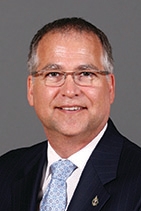 Last spring, Prime Minister
Stephen Harper described Southern Ontario as a region with "distinct needs," adding that its people deserved economic programs
delivered in ways specifically tailored to their own priorities.
Last spring, Prime Minister
Stephen Harper described Southern Ontario as a region with "distinct needs," adding that its people deserved economic programs
delivered in ways specifically tailored to their own priorities.
The Federal Economic Development Agency for Southern Ontario, or FedDev Ontario, was announced in Budget 2009 to help the region recover from the effects of the global economic recession and set the foundation for prosperity going forward. Since its formation in August 2009, the agency has been working with the communities, businesses and residents of Southern Ontario to help reshape the region's economy as part of its economic recovery.
FedDev Ontario is responsible for delivering infrastructure programs in Ontario, as well as economic development programs throughout Southern Ontario. The initial focus is to help hard-hit areas recover from the short-term effects of the global economic downturn with targeted investments in critical infrastructure projects, research initiatives and innovative business growth plans.
Already we are helping to create new jobs and opportunities throughout Southern Ontario by encouraging innovative ideas and the commercialization of research and investments in advanced manufacturing. Heading into our first full year of operation, we aim to implement more community and economic development initiatives that address not only the needs of today, but help communities and businesses meet the challenges of tomorrow.
I am pleased to submit, for tabling in Parliament, the following 2010–2011 Report on Plans and Priorities (RPP) for the Federal Economic Development Agency for Southern Ontario, which outlines how FedDev Ontario will contribute to making the province more competitive, diversified and prosperous.
The Honourable Gary Goodyear
Minister of State (Science and Technology)
(Federal Economic Development Agency for Southern Ontario)
President's Message
 The Federal Economic Development
Agency for Southern Ontario, or FedDev Ontario, is entering its first full year of operation with momentum. I am honoured
to be the President of this organization as it begins to fully implement its programs aimed at renewing the Southern Ontario
economy.
The Federal Economic Development
Agency for Southern Ontario, or FedDev Ontario, is entering its first full year of operation with momentum. I am honoured
to be the President of this organization as it begins to fully implement its programs aimed at renewing the Southern Ontario
economy.
FedDev Ontario was announced in Budget 2009 in response to the effects of the global economic recession on Southern Ontario, with a budget of $1 billion over five years. Already the agency's programs are having an immediate impact on communities and businesses. Through initiatives like the Southern Ontario Development Program (SODP), which will deliver close to $176 million in funding in 2010–2011, as well as the Community Adjustment Fund (CAF) and the Recreational Infrastructure Canada (RInC) Program in Ontario, the Agency is addressing critical short-term infrastructure requirements while laying the groundwork for future economic prosperity.
FedDev Ontario fulfills the Government's mandate to build a regional economy that is more diverse and robust. Our programs help innovators take their products to market and encourage the knowledge-based jobs of tomorrow. In particular, the agency is preparing Southern Ontario's manufacturing sector for new economic realities. FedDev Ontario's targeted investments will help manufacturers compete in the global marketplace by increasing productivity levels and encouraging innovation.
Our organization is also engaged in outreach and consultations with stakeholders to seek input on how we can work together to chart a new path — one that is focused on stable, long-term economic growth.
I respectfully submit, for tabling in Parliament, FedDev Ontario's 2010–2011 Report on Plans and Priorities (RPP). The document outlines our immediate goals and initiatives, as well as our long-term priorities.
B.A. (Bruce) Archibald, Ph.D.
President
Federal Economic Development Agency for Southern Ontario
Section I: Agency Overview
Raison d'être and Responsibilities
The Economic Action Plan introduced in Budget 2009 provided $1B over five years for a new Southern Ontario development agency to support restructuring, community and business development, innovation and commercialization initiatives, and other measures to promote economic diversification in Southern Ontario. The Federal Economic Development Agency for Southern Ontario (FedDev Ontario) was formally established on August 13, 2009. In launching FedDev Ontario, Prime Minister Harper said:
"The global recession has created challenges in every region of our country, including Southern Ontario. This is a region with distinct needs, and the people of Southern Ontario deserve economic programs delivered in ways specifically tailored to their own priorities. FedDev Ontario is one more tool to ensure that workers and businesses in Southern Ontario have the resources they need to succeed."
This Agency is charged with delivering federal government economic development programs tailored to the specific priorities of workers, businesses and communities in Southern Ontario.
Mandate
The mandate of FedDev Ontario is to help support excellence by making the Southern Ontario economy and its communities more competitive, innovative and diversified.
Scope of Operations
FedDev Ontario is headquartered in Kitchener and has offices in Stratford, Peterborough, Toronto and Ottawa.
The designated geographic area for the Agency consists of the following 37 Statistics Canada census divisions:
1 Stormont, Dundas and Glengarry
2 Prescott and Russell
6 Ottawa
7 Leeds and Grenville
9 Lanark
10 Frontenac
11 Lennox and Addington
12 Hastings
13 Prince Edward
14 Northumberland
15 Peterborough
16 Kawartha Lakes
18 Durham;
19 York
20 Toronto
21 Peel
22 Dufferin
23 Wellington
24 Halton
25 Hamilton
26 Niagara
28 Haldimand-Norfolk
29 Brant
30 Waterloo
31 Perth
32 Oxford
34 Elgin
36 Chatham-Kent
37 Essex
38 Lambton
39 Middlesex
40 Huron
41 Bruce
42 Grey
43 Simcoe
46 Haliburton
47 Renfrew
According to the 2006 Census, this area has a population of over 11 million, representing approximately 93% of Ontario's total population and 36% of the total population of Canada.
Governance
FedDev Ontario is part of the Industry portfolio. Its President oversees Agency operations and resources, and reports to the Honourable Gary Goodyear, Minister of State (Science and Technology) (Federal Economic Development Agency for Southern Ontario).
The Executive Committee is the Agency's main governing body. It sets strategic directions and develops, reviews and approves strategic plans, budgets and any other documents or submissions of strategic importance. The Executive Committee is composed of the Agency President (who also acts as chair), the Vice President of Infrastructure, the Vice President of Business and Community Programs, the Director of Audit and Evaluation, the Director General of Communications, the Chief Financial Officer, the Director General of Strategic Policy and the Director of Human Resources.
Strategic Outcome and Program Activity Architecture (PAA)
The Strategic Outcome and Program Activity Architecture are used to guide planning and reporting for the Agency.
PAA Crosswalk
To achieve its strategic outcome, FedDev Ontario administers and delivers programs that receive funding from various sources. The table below shows the origin of each program and where it is found in FedDev Ontario's Program Activity Architecture (PAA). For example, the Community Adjustment Fund of Canada's Economic Action Plan is found under sub-program activity 1.1.7, "Development Projects for Communities and Businesses," while the Recreational Infrastructure Fund falls under program activity 1.2, "Infrastructure."
All program expenditures are reported according to the structure and coding of the officially approved FedDev Ontario PAA.
Origin of FedDev Ontario Program |
Program |
Program/Sub-program in PAA |
|---|---|---|
Canada's Economic Action Plan (Budget 2009) |
Community Adjustment Fund |
1.1.7 |
Recreational Infrastructure Fund |
1.2 |
|
Eastern Ontario Development Program |
1.1.2 |
|
FedDev Ontario |
Southern Ontario Development Program |
1.1.1 |
Former Industry Canada Programs Transferred to FedDev Ontario |
Community Futures Program |
1.1.3 |
Ontario Potable Water Program |
1.1.5 |
|
Economic Development Initiative |
1.1.4 |
|
Brantford Greenwich-Mohawk Remediation Project |
1.1.6 |
|
Infrastructure Canada |
Canada-Ontario Infrastructure Program |
1.2 |
Building Canada Fund |
1.2 |
|
Canada Strategic Infrastructure Fund |
1.2 |
|
Canada-Ontario Municipal Rural Infrastructure Fund |
1.2 |
|
Municipal Rural Infrastructure Top-Up Fund |
1.2 |
Planning Summary
Financial and Human Resources
| 2010–11 | 2011–12 | 2012–13 | |
|---|---|---|---|
| Financial Resources ($ millions) | 507.0 | 216.0 | 214.2 |
| Human Resources (Full-time equivalents – FTEs) | 200 | 250 | 250 |
The reduction in Financial Resources in 2011–2012 results from the sunsetting of current authorities for the Community Adjustment Fund (CAF), the Recreational Infrastructure Canada Fund (RInC), the Eastern Ontario Development Program (EODP), the Ontario Potable Water Program (OPWP) and the Building Canada Fund (BCF).
In contrast, the growth in the FTE count reflects a fully staffed FedDev Ontario as of 2011–2012. In 2010–2011, some work will be managed using temporary staff and other contractual arrangements until permanent staffing can be completed.
Summary Tables by Strategic Outcome
| Performance Indicator | Targets |
|---|---|
| Annual GDP growth rate for Southern Ontario | 3% |
*http://southernontario.gc.ca/eic/site/723.nsf/eng/h_00102.html |
|||||
| Program Activity | Forecast Spending 2009–10 |
Planned Spending | Alignment to Government of Canada Outcomes* | ||
|---|---|---|---|---|---|
| 2010–11 | 2012*–12** | 2012–13** | |||
| Community and Business Development | 299.8 | 395.0 | 204.5 | 202.8 | An innovative and knowledge-based economy Strong economic growth |
| Infrastructure | 113.7 | 98.4 | 0.2 | 0.1 | Strong economic growth |
| Internal Services | 14.9 | 13.6 | 11.3 | 11.3 | Not applicable |
| Total Planned Spending | 507.0 | 216.0 | 214.2 | ||
The change in Internal Service expenditures after 2010–2011 reflects reduced start-up costs and lower program expenditures. Expenditures under the Community and Business Development program will change after the 2010–2011 fiscal year as the CAF and EODP sub-programs sunset. The major factor impacting infrastructure spending in 2011–2012 will be the sunsetting of the RInC program. Projected expenditures for 2011 through 2013 are largely attributable to the five-year Southern Ontario Development Program (SODP)
Contribution of Priorities to Strategic Outcome
Agency Priorities for 2010–2011
| Strategic Outcome | Management Priorities (New) | Description |
|---|---|---|
| The economy of Southern Ontario is competitive and diversified | Establish the Agency's internal services | Build an internal service structure and capability that allows the Agency to effectively manage its affairs and minimize the amount of services procured under Memoranda of Understanding (MOU) and contractual arrangements |
| Develop the Agency's organizational structure, plans, procedures and processes | Adopt a proactive approach to planning and introduce efficient processes and policies for effective management | |
| Develop the Agency's research and policy capacity | Ensure the Agency has the capacity to undertake research and policy analysis to help guide its programs and priorities | |
| Develop program delivery capacity, such as fully trained staff, databases etc. | Build community and business development program capacity to a level comparable to established infrastructure program delivery capacity | |
| Operational Priorities (Ongoing) | Description | |
| Conduct outreach and consultations | Champion dialogue with key stakeholders and citizens across Southern Ontario, focusing on emerging opportunities and challenges in the region | |
| Develop effective program delivery mechanisms | Continue to develop program delivery approaches that maximize benefits to Southern Ontario clients, e.g., broadening the scope of potential program delivery partners | |
| Manage EAP initiatives | Since RInC and CAF expire in March 2011, give additional attention to performance and results measurement | |
| Continue to deliver legacy programs | Deliver programs on behalf of Infrastructure Canada through the FedDev Ontario regional network |
Operating Environment and Risk Analysis
External Operating Environment
The financial crisis, the resulting sharp economic downturn, and weakening U.S. demand for Southern Ontario goods and services have intensified the need for adjustment in the region to stem job losses and economic distress.
Despite signs of economic recovery in Canada, growth is likely to remain subdued according to the International Monetary Fund (IMF)*. Many Canadians will face financial challenges as the unemployment rate reaches the 9% level for 2010**. Certain distressed communities in Southern Ontario are likely to see unemployment rates several percentage points above 9%. Sustained growth partly depends on the strength of Southern Ontario's export industries, which are affected by the economic challenges facing Canada's trading partners and by the strength of the Canadian dollar.
In pursuit of its mandate, FedDev Ontario is engaged in outreach and consultations with the most vulnerable communities and businesses in the Southern Ontario economy. Agency program activities are diverse and highly dependent on partnerships for delivery. Internal audits and reviews are planned to ensure the efficiency and effectiveness of these programs.
Internal Operating Environment
Risk and mitigation strategies for 2010–2011 and beyond are described below. Risks are ranked according to the product of their impact and likelihood of occurrence.
Key Risks |
Mitigation Strategies |
|---|---|
Compliance: The Agency must have experienced resources in place to ensure the compliance of all recipients with program terms and conditions due to the large number of specific projects and associated reporting requirements. |
Experienced resources in the Toronto office have been transferred from Industry Canada to the Agency to assist with program delivery. The Atlantic Canada Opportunities Agency (ACOA) is providing FedDev Ontario with additional experienced resources under an MOU arrangement. |
Performance Measurement: The Agency will ensure that it meets the challenges in reporting on results for short-term programs due to the large number of recipients. |
FedDev Ontario has worked to develop an appropriate short-term performance measurement strategy. With the RInC program, for example, the province has prime responsibility for ensuring projects are completed "on time, on budget." The province has a clear understanding of the reporting requirements involved. |
Delivery Capacity: As a new organization, FedDev Ontario is addressing a number of administrative and operational challenges. |
The Agency will continue to draw on experienced resources through Memoranda of Understanding and other contractual arrangements until sufficient internal capacity is developed. |
Excess Demand: High demand for funding might be a program management challenge. |
Proposals will be assessed and given priority based on program eligibility criteria. |
Canada's Economic Action Plan (EAP)
In its 2009 Budget the Government of Canada announced Canada's Economic Action Plan. Under the heading*** "Action to Support Businesses and Communities," Budget 2009 addressed the short-term economic challenges facing different sectors, regions and communities as a result of the global financial crisis and helped position them for long-term competitiveness. As part of this initiative, $1 billion over five years was earmarked for the creation of a Southern Ontario development program to help workers, communities and businesses in the region.
Following the Budget 2009 announcement, Industry Canada used various tools within its Portfolio, including agreements with the National Research Council of Canada and the Business Development Bank of Canada, to support projects encouraging economic development in Southern Ontario. These initiatives were undertaken while government officials worked to establish the policy and governance mechanisms of FedDev Ontario.
Economic Action Plan program initiatives also included the Community Adjustment Fund, the Eastern Ontario Development Program and the Recreational Infrastructure Canada program. FedDev Ontario administers these programs in addition to its core Southern Ontario Development program.
Since its inception, FedDev Ontario has provided 2009–2010 and multi-year funding to many Ontario municipalities, including Welland, Orillia, Oshawa, Oxford County and Kingston. Several industry sectors also received funding, including Ontario food & beverage processors and the micro-satellite technology industry.
Expenditure Profile
The chart below shows FedDev Ontario program spending in 2010–2011 as divided among Canadian Economic Action Plan (EAP) initiatives, programs transferred to FedDev Ontario from Industry Canada, FedDev Ontario's core program, SODP and legacy programs delivered on behalf of Infrastructure Canada.
Program initiatives shown in the chart below are EAP, SODP, former Industry Canada programs and the delivery of infrastructure programs for Infrastructure Canada
Planned 2010–2011 Spending by Program Initiative
Spending Trend ($millions)
Significant variations in FedDev's Ontario's expenditure profile over the planning period are attributable to sunsetting funds.
* The Agency was not created until August 13, 2009. (Back to text) |
|||
Vote # or Statutory Item (S) |
Truncated Vote or Statutory Wording |
2009–2010* |
2010–2011 |
|---|---|---|---|
50 |
Operating expenditures |
NA |
34.0 |
55 |
Grants and contributions |
NA |
469.5 |
(S) |
Contributions to employee benefit plans |
NA |
3.4 |
Total |
NA |
507.0 |
|
* IMF Press Release No 9/410: http://www.imf.org/external/np/sec/pr/2009/pr09401.htm (Back to text)
** Finance Canada: Update of Economic and Fiscal Projections
September 2009:
http://www.fin.gc.ca/ec2009//ec03-eng.asp (Back
to text)
***http://www.budget.gc.ca/2009/pdf/budget-planbudgetaire-eng.pdf (Back to text)
Section II: Analysis of Program Activities by Strategic Outcome
The Economy of Southern Ontario Is Competitive and Diversified
Southern Ontario is undergoing a process of rapid structural adjustment. After a period of robust growth from the mid-1990s to 2004, buoyed notably by relatively low Canadian currency values and high U.S. demand, many of the region's traditionally strong industries, particularly the manufacturing and automotive sectors, are facing major challenges. The current financial crisis, the resulting sharp economic downturn and weakening U.S. demand for Southern Ontario goods and services have intensified the need for adjustment in the region to stem job losses and economic distress.
According to Statistics Canada, Ontario's unemployment rate reached 9.6% in the summer of 2009, the highest rate in fifteen years, at a time when the national average was 8.6%. Certain communities in Southern Ontario, particularly in the southwestern area, had very high unemployment figures: Windsor, 14.4%; St. Catharines-Niagara, 10.9%; London, 10.4%; and Kitchener, 9.9%.
Statistics Canada reported that employment levels in Ontario had fallen by 232,000 since October 2008. Over half of these job losses were in the manufacturing sector. Southern Ontario's manufacturing sector has seen a steady structural decline since 2004. FedDev Ontario's programs help Southern Ontario's manufacturing sector face these new economic realities and compete more effectively in the global marketplace by bolstering productivity levels through investment and innovation.
Planned Spending Breakdown by PAA Program Activity 2010–2011
Program Activity by Strategic Outcome
| Program Activity Expected Results | Performance Indicators | Targets |
|---|---|---|
| Enterprises are contributing to community economic growth and viability | Percentage of SMEs assisted that maintained or increased their sales |
70% |
The Community and Business Development program supports communities and businesses in Southern Ontario by making the Southern Ontario economy and its communities more competitive, innovative and diversified. This will be achieved by increasing economic opportunities, increasing community and business capacity to respond to challenges, stimulating economic development and promoting conditions that foster competitive businesses and sustainable communities. Through this program, FedDev Ontario delivers and administers grants and contributions with not-for-profit organizations, other levels of governments and businesses. The funds are used to enhance business productivity and competitiveness; provide entrepreneurs and small and medium-sized enterprises with improved access to capital and business development information and services; and support community economic planning, development and diversification initiatives.
This program benefits businesses and communities in Southern Ontario by providing them with opportunities, support and guidance to which they would not have access without this program
FedDev Ontario will implement this program activity through the following sub-activities:
- Southern Ontario Development Program
- Eastern Ontario Development Program
- Community Futures Program
- Official Languages Minority Communities Development Program
- Ontario Potable Water Program
- Brantford Greenwich-Mohawk Remediation Project
- Development Projects for Communities and Businesses, which includes the Community Adjustment Fund (Southern Ontario Component)
Expected Results |
Indicators |
Targets |
|---|---|---|
| Communities in Southern Ontario are viable and businesses in the region are competitive | Number of businesses and organizations created, expanded or maintained as a result of support from SODP | 700 |
| Ratio of funds raised from other sources to SODP contributions | 1:1 |
Expected Results |
Indicators |
Targets |
|---|---|---|
| Communities in Southern Ontario are viable and businesses in the region are competitive | Number of Eastern Ontario businesses and organizations created, expanded or maintained as a result of support from EODP | 50 |
| Ratio of funds raised from other sources to Eastern Ontario Development Program (EODP) contributions | 4.5:1 |
Expected Results |
Indicators |
Targets |
|---|---|---|
| Communities in rural Southern Ontario are viable and businesses in the region are competitive | Ratio of funds raised from other sources to federal Community Futures (CF) Program investments | 1.7:1 |
| Number of businesses created, expanded, maintained or strengthened in rural Southern Ontario by Community Futures Development Corporations (CFDCs) | 2250 |
Expected Results |
Indicators |
Targets |
|---|---|---|
| SMEs in official language minority communities have improved access to economic development projects | Number of projects or activities (innovation, diversification, partnerships or number of SMEs supported) | 35 |
Expected Results |
Indicators |
Targets |
|---|---|---|
| Increased community capacity to respond to economic development opportunities and challenges in recipient communities | Number of grants distributed to target groups | 30 |
| Value of grants delivered to target groups | $22.5 million |
Expected Results |
Indicators |
Targets |
|---|---|---|
| Fifty acres of remediated land in Brantford, Ontario suitable for residential development, some light commercial development and a cultural/heritage component | Achievement of project milestones (i.e., removal of on-site tenants, preparation of final development plan, call for tenders to redevelop the site, demolition of remaining buildings on the site, remediation to provincial standards, registration of site condition with the Ontario Ministry of the Environment) |
Demolition of existing on-site buildings |
| * This sub-program is also known as the Community Adjustment Fund (CAF). (Back to text) | ||
Expected Results |
Indicators |
Targets |
|---|---|---|
| Development projects enhance or accelerate community and business development in Ontario | Number of development projects supported that would not have been realized without CAF investment | 100 |
| Number of communities benefiting from development projects | 75 | |
| Ratio of program investment to investment from other sources | 1:1 | |
Planning Highlights and Benefits for Canadians
In order to achieve the expected result, FedDev Ontario will undertake the following key activities:
Southern Ontario Development Program (SODP)
The Southern Ontario Development Program (SODP) is a core program of FedDev Ontario. It builds upon the assets and strengths of communities to create an environment where businesses can thrive and maximize Southern Ontario's potential to succeed in the knowledge-based economy. Its objective is to promote economic development, diversification and innovation. The Southern Ontario Development Program will deliver close to $176 million in funding in 2010–2011.
Under this Program Activity, FedDev Ontario will also deliver a number of initiatives that were announced under Canada's Economic Action Plan (Budget 2009), including:
Eastern Ontario Development Program (EODP)
The government renewed the EODP under Canada's Economic Action Plan (Budget 2009) at $20 million over two years. EODP-funded activities began in summer 2009. In 2010–2011, the Agency will strengthen the economy of rural Eastern Ontario further by investing $9.6 million to help develop a competitive and diversified economy, create jobs and ensure the region's long-term growth and prosperity.
The EODP will be delivered by the 15 Community Futures Development Corporations (CFDCs) located throughout rural Eastern Ontario.
The resources provided to the CFDCs will be used to invest in local and regional projects within six key economic development priorities:
- Innovation and Deployment of Information and Communications Technologies
- Business Development
- Community Development
- Skills Development
- Attraction and Retention of Youth
- Improved Access to Capital and Leveraged Capital
FedDev Ontario will consult with the 15 CFDCs and other stakeholders beginning in March 2010 regarding program priorities and performance targets for the fiscal year 2010–2011.
Community Adjustment Fund Intake II (CAF)
FedDev Ontario will also continue to deliver the CAF program that was part of Canada's Economic Action Plan. The second phase of the CAF was launched on December 15, 2009.
Small and medium-sized enterprises, municipalities, not-for-profit organizations, Aboriginal organizations, colleges and universities are all eligible to submit projects. The Community Adjustment Fund will support projects in and around resource-based and manufacturing communities that are dependent on a single industry. The fund will invest in projects that create immediate job opportunities for communities. It will focus not only on economic development, but innovation and diversification.
Overall funding for the second intake process will be $127.8 million in 2010–2011.
| * Infrastructure spending for the years 2011–2012 and 2012–2013 does not include expenditures on behalf of Infrastructure Canada. (Back to text) | |||||
| Human Resources (FTEs) and Planned Spending ($ millions) | |||||
|---|---|---|---|---|---|
| 2010–11 | 2011–12 | 2012–13 | |||
| FTEs | Planned Spending | FTEs | Planned Spending | FTEs | Planned Spending |
| 32 | 98.4 | 32 | 0.2 | 32 | 0.1 |
| Program Activity Expected Results | Performance Indicators | Targets |
|---|---|---|
| Ontario has the infrastructure required to sustain its development | Number of infrastructure projects administered | 50 |
| Ratio of funds raised from other sources for every dollar of Ontario infrastructure improvement | 11 |
FedDev Ontario delivers infrastructure programming in Ontario to ensure that communities have good quality and dependable infrastructure in place such as water, sewage and transportation infrastructures, and that residents benefit from access to this infrastructure. Community infrastructure is an essential building block for community development, and strategic infrastructure investments can be a catalyst for a community to grow and prosper. Through this program, FedDev Ontario delivers and administers contribution agreements with municipalities or contractors, which use these funds to create, renew or enhance Ontario communities' infrastructure. This program benefits residents of Ontario by contributing to the development and maintenance of infrastructure in Ontario, thereby helping Ontario residents have access to quality infrastructure meaning, for example, access to water that is safe to drink and roads that are safe to drive on.
The RInC initiative, representing spending of about $95 million in 2010–2011, falls under the FedDev Ontario Infrastructure program and accounts for most of the program's budget.
Planning Highlights and Benefits for Canadians
In 2010–2011, FedDev Ontario will continue to work with Infrastructure Canada to deliver a suite of infrastructure programs in the province of Ontario, including the Canada-Ontario Infrastructure Program, Canada-Ontario Municipal Rural Infrastructure Fund, Canada Strategic Infrastructure Fund, Municipal-Rural Infrastructure Top-Up Fund and Building Canada Fund. These programs represent hundreds of millions of dollars in investment in key infrastructure projects across the country.
The administration of infrastructure funding throughout Ontario coupled with economic development investments in community projects will enhance growth, profitability and competitiveness by establishing reliable water, transportation and waste management infrastructure, and by building community capacity in sport, tourism, housing and other sectors.
By delivering programs and services that support SME growth and competitive and self-sustaining communities across Ontario, the Agency will help build economically healthier regions that contribute to economic growth.
FedDev Ontario's value-added is the efficient and effective delivery of infrastructure funding provided by Infrastructure Canada.
Recreational Infrastructure Canada (RInC)
In 2010–2011, FedDev Ontario will continue to work with the Ontario government to administer and deliver the Ontario portion of RInC, a Canada's Economic Action Plan initiative from Budget 2009. This program uses contribution agreements to help upgrade and renew recreational infrastructure such as arenas, swimming pools, tennis courts, baseball fields and other recreational facilities. This program benefits Canadians by creating employment, mostly in construction-related jobs, and by renewing and upgrading recreational infrastructure in Ontario.
Canada's Economic Action Plan (EAP)
Initiatives originating from EAP and discussed in detail above are the:
- Recreational Infrastructure Fund,
- Community Adjustment Fund and
- Eastern Ontario Development Program.
Budget 2009 also presented the $1 billion earmarked over five years for the Southern Ontario Development Program (SODP).
Expected Results |
Indicators |
Targets |
|---|---|---|
Communities in Southern Ontario are viable and businesses in the region are competitive |
Number of businesses and organizations created, expanded or maintained as a result of support from SODP |
700 |
Ratio of funds raised from other sources to SODP contributions |
1:1 |
Amongst these EAP initiatives, the SODP has the largest expenditure over the 2010–2011 period. The expected results of program spending, performance indicators and performance targets are given in the table above. Some 700 businesses and organizations are expected to be created, expanded or maintained as a result of SODP support. In addition, it is anticipated that $1 will be raised from other sources for every $1 of SODP contributions.
| * This sub-program is also known as the Community Adjustment Fund, (CAF). (Back to text) | ||
Expected Results |
Indicators |
Targets |
|---|---|---|
| Development projects enhance or accelerate community and business development in Ontario | Number of development projects supported that would not have been realized without CAF investment | 100 |
| Number of communities benefiting from development projects | 75 | |
| Ratio of program investment to investment from other sources | 1:1 | |
The next largest expenditures over the 2010–2011 period will come from the Community Adjustment Fund (CAF). Without CAF support, one hundred new development projects would not have been realized and 75 communities would not have benefited. It is also anticipated that $1 will be raised from other sources for every $1 of CAF investments.
| Human Resources (FTEs) and Planned Spending ($ millions) | |||||
|---|---|---|---|---|---|
| 2010–11 | 2011–12 | 2012–13 | |||
| FTEs | Planned Spending | FTEs | Planned Spending | FTEs | Planned Spending |
| 65 | 13.6 | 92 | 11.3 | 92 | 11.3 |
Internal services are groups of related activities and resources that are administered to support the needs of programs and other corporate obligations of our organization. These groups are Management and Oversight Services, Policy and Research Services, Communications Services, Legal Services, Human Resource Management Services, Financial Management Services, Information Management Services, Real Property Services, Acquisition Services, Travel and Other Administrative Services.
Internal Services include only those activities and resources that apply across an organization and not those specific to a program.
Section III: Supplementary Information
List of Tables Available Online
- Southern Ontario Development Program (SODP)
- Eastern Ontario Development Program
- Community Futures Program
- Official Languages Minority Communities Development Program
- New Architecture for Infrastructure Support — Building Canada Fund Ontario Potable Water Program (OPWP)
- Brantford Greenwich–Mohawk Remediation Project
- Development Projects for Communities and Businesses Community Adjustment Fund (Southern Ontario) Canada-Ontario Infrastructure Program (COIP)
- Recreational Infrastructure Canada Program in Southern Ontario
- Federal Economic Development Agency for Southern Ontario
- Evaluations
Additional Information
Details of Transfer Payment Programs (TPP)
Transfer payment tables have been provided for all programs that have annual expenditures greater than $5 million or that are of particular interest. Thus a table has been prepared for the Official Languages Minority Communities Development Program, even though its annual expenditures are less than $5 million.
Internal Audits
No internal audits are planned at this time. A multi-year, risk-based internal audit plan is scheduled to be developed by the President in Q4 of the 2009–2010 fiscal year. Projects under consideration are subject to ongoing risk assessments.
Sources of Respendable and Non-Respendable Revenue
There are no respendable and non-respendable revenues at present. The Agency is developing policy and procedures for program repayments. Repayments are expected from profit-generating entities that received funds from CAF and SODP sources.
Other Items of Interest
The Agency is also responsible for delivering infrastructure programs across all of Ontario. These programs include:
- Building Canada Fund – Communities Component (Ontario) – $197 million*
- Building Canada Fund – Major Infrastructure Component (Ontario) – $24 million*
- Canada-Ontario Infrastructure Program (Ontario) – $12 million
- Canada Strategic Infrastructure Program (Ontario) – $25 million*
- Canada-Ontario Municipal Rural Infrastructure Fund (Ontario) – $66 million*
- Municipal Rural Infrastructure Fund Top-Up (Ontario) – $25 million*
* Figures represent expected 2009–2010 expenditures on behalf of Infrastructure Canada. Figures for the 2010–2013 period are not available
